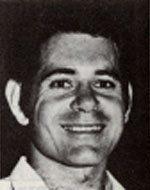David, son of Adina and Moshe, was born on 19.9.1951 in Jerusalem. He was named after his mother’s grandfather, David Yellin, who was one of the fathers of the Yishuv and chairman of the National Committee between 1929-1920. When David was two years old, his family moved to Haifa and later moved to Bethlehem of Galilee. He studied at the “Alon Hagalil” elementary school where he lived, and later graduated from the “Greenberg” high school in Kiryat Tivon. He grew up and was educated in the Galilean moshav of Bethlehem but was very attached to his hometown of Jerusalem, and eventually built his home there. David, who was known as my uncle, was a noble soul, behaved with gentleness and tenderness, and all his ways were kind and loving. From his youth he was eager to learn, to acquire knowledge, and to expand his education. He was always a partner in all social and cultural activities, took on roles and tasks and filled them whole. David was entrepreneurial and entrepreneurial, had a leadership capacity and was willing to take responsibility and fulfill any task assigned to him or volunteered to fill it. He aspired to excel and knew how to invest efforts and to work diligently and persistently to achieve his goals. Despite his ambition and great energy, he was modest and restrained, with serious and mature judgment, he acted with moderation and patience, but at the same time he insisted firmly on his and defended his opinions with passion and persistence. He was earnest and mature with the cheerfulness of youth and he studied diligently and worked diligently, but he also spent much of his life. My uncle studied history and Jewish thought, for these were subjects he loved and wanted to specialize in. He did not see his studies as a hurdle to dig, but learned for the pleasure of it and a desire to be able to impart to others the knowledge he had acquired. Therefore, many of his friends expected him to turn to teaching. His love for Jerusalem and his love of history merged. He strolled through the city, enjoying its landscapes and yet delving into the historical background of its sites. His friends listened to his reviews and excellent explanations of the city and its history. He was able to find parallels from history to today’s reality, participated in debates on political matters, and established his views and views on past experience and chronicles, which he knew well and which he believed constituted an appropriate basis for examining the present. My uncle was a pacifist and a pacifist and a member of the camp, who called for peace and coexistence with the Arabs. He studied the history of the Zionist movement and argued with great fervor that the conflict between the peoples could be resolved peacefully. He was not satisfied with study and research, but tried to convince others of the justice of his views. His approach to political and social problems influenced his moderate character and his restrained manner. He believed in peace through compromise and defended his views with devotion. He supported the thorough and comprehensive analysis of historical phenomena and therefore was certain of his righteousness. David was drafted into the IDF in early 1969 and asked to serve in the Armored Corps, as he believed that this force was to decide the fate of the military campaign, after which he was trained as a tank driver and later completed a tank commander course and was sent to serve in a tank battalion in Sinai. He was a young and inexperienced man who was able to fulfill all the tasks assigned to him, and he had the ability to lead and organize and was willing to help all of them. A friend who needed his help, and was released from the service in early 1972 He was assigned to a reserve unit of the Armored Corps and was admitted to the pre-academic preparatory program at the Hebrew University of Jerusalem, where he spent all his energy studying, cut himself off from his day-to-day affairs and concentrated on his studies. And after thatHe joined the staff of the Institute for Social Research. His work involved contact with an audience and he was very open minded and had close ties with many people. In Jerusalem, his favorite city, he was studying and working, touring, sports and listening to music. He liked to listen to jazz music and devoted long evenings to listening to his favorite tunes. He enjoyed the combination of sounds and instruments, looked for special performance and was unknowable in his search until he found a record of his favorite rendition. In September 1973, David married his girlfriend Carmela and set up his home in Kiryat Yovel in Jerusalem. Carmela shared his love: trips to Jerusalem and the long evenings of listening to music. When the Yom Kippur War broke out, my uncle separated from his wife, who had been married three weeks before. He joined his unit, which participated in the battles of containment and infiltration against the Egyptians in the Sinai. My uncle turned out to be a brave warrior and an excellent commander and took part in fierce and bitter battles. On October 16, 1973, his unit helped to break through the Suez Canal in preparation for a success, and my uncle was killed and killed in a cemetery in Bethlehem of Galilee, leaving behind a wife, parents and three brothers. In a letter of condolence to the bereaved family, the commander of the unit wrote: “Sergeant Keshet David served in an armored unit and was one of the most talented and devoted tank commanders in the fighting, serving as an example of courage and leadership. , One of the best and most expensive ones we lost. ” Members of his family published a pamphlet in his memory, including his parents, his wife, classmates, and comrades in arms
